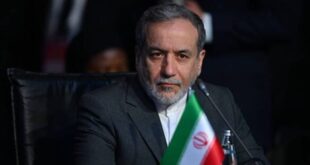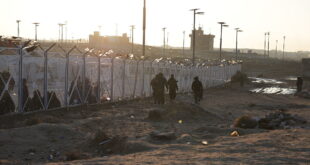 TEHRAN (FNA)- Iran’s top nuclear negotiator Saeed Jalili on Monday spoke by phone with EU foreign policy chief Javier Solana on the standoff over Tehran’s nuclear program.
TEHRAN (FNA)- Iran’s top nuclear negotiator Saeed Jalili on Monday spoke by phone with EU foreign policy chief Javier Solana on the standoff over Tehran’s nuclear program.
“The conversation took place and Solana will report on it to the representatives of the group of six,” powers involved in the talks – Britain, China, France, Russia, the United States and Germany – a Solana spokesman told AFP.
The spokesman gave no details on the conversation or how long the two men talked.
A Solana spokesman had said earlier on Monday that he could not immediately confirm the planned contact between the two top negotiators.
But in Tehran earlier, new Foreign Ministry Spokesman Hassan Ghashghavi told reporters that Iran would hold talks with Solana on Monday.
Ghashghavi said, “Negotiations are an ongoing process and the question of deadline is media speculation.”
At the last meeting between Jalili and Solana on July 19 in Geneva, Solana asked for a response to the package.
Solana presented an offer of economic and trade incentives in mid-June, while Iran has put forward its own proposal, an all-embracing package of suggestions to resolve the problems of the world, including the nuclear issue.
The United States had demanded that Iran meet a weekend deadline to respond to a package of incentives aimed at persuading Tehran to give up NPT right of uranium enrichment amid warnings of new sanctions.
But an EU diplomat said on Friday, “If it’s in 16 days instead of 14 it’s not a problem. We are not obsessed with a date.”
Iran on Thursday rejected any deadline to give a final response to a package drawn up by world powers, and said there should be more negotiations to reach a deal.
“The language of deadline-setting is not understandable to us. We gave them our response within a month as we said we would, now they have to reply to us,” Iranian Foreign Minister Manouchehr Mottaki told reporters on Thursday.
Mottaki said Iran and representatives of the major powers had agreed at a July 19 meeting in Geneva to find common ground on both sides’ proposals aimed at ending the five-year standoff over Tehran’s nuclear drive.
“Both sides said that in future meetings they should work on the communalities of both frameworks in a constructive way to reach an agreement that satisfies both sides, otherwise Iran’s constructive activities will take their natural course,” he said.
Tehran’s arch-foe, the United States, insisted on Wednesday that Iran must give an answer on Saturday, warning of consequences of any defiance by the Islamic republic.
But, Washington took back its words on Thursday and denied its previous ultimatum to Tehran that it should present its answer till Saturday or face more sanctions.
“I didn’t count the days. It’s coming up soon,” US State Department spokesman Sean McCormack told reporters Thursday when asked if August 2 was the deadline for Iran to accept or reject the package.
Not only did McCormack omitted mentioning a strict deadline, he also said there was “no indication of that” when asked whether Washington would pull the incentives offer off the table.
The US-led West claims that Iran’s atomic program is a cover for making nuclear weapons, a charge vehemently denied by Tehran which says it needs nuclear power to produce electricity for a growing population.
Despite the rules enshrined in the Non-Proliferation Treaty (NPT) entitling every member state, including Iran, to the right of uranium enrichment, Tehran is now under three rounds of UN Security Council sanctions for turning down West’s illegitimate calls to give up its right of uranium enrichment.
Tehran has dismisses West’s demands as politically tainted and illogical, stressing that sanctions and pressures merely consolidate Iranians’ national resolve to continue the path.
Iran has also insisted that it would continue enriching uranium because it needs to provide fuel to a 300-megawatt light-water reactor it is building in the southwestern town of Darkhoveyn as well as its first nuclear power plant in the southern port city of Bushehr.
Iran has so far ruled out halting or limiting its nuclear work in exchange for trade and other incentives.
Iranian President Mahmoud Ahmadinejad said on Saturday that although Iran welcomes talks on its nuclear program it will not budge an inch on its rights.
 Eurasia Press & News
Eurasia Press & News


